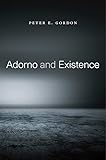Adorno and existence
Material type: TextPublication details: England Harvard University Press 2016Description: xiv, 256 p. 22 cmISBN:
TextPublication details: England Harvard University Press 2016Description: xiv, 256 p. 22 cmISBN: - 9780674734784
- 193 23 GO-A
- B3199.A34 G67 2016
 Print
Print
| Item type | Home library | Collection | Call number | Status | Date due | Barcode | |
|---|---|---|---|---|---|---|---|
 Print
Print
|
OPJGU Sonepat- Campus Main Library | General Books | 193 GO-A (Browse shelf(Opens below)) | Available | 135833 |
Includes bibliographical references and index.
Introduction: A philosophical physiognomy -- Starting out with Kierkegaard: An unlikely cathexis -- The Kierkegaard reception in Germany -- Adorno's Kierkegaard-book -- Reading Kierkegaard against the grain -- Aesthetics and interiority -- Wahl's Études kierkegaardiennes -- Kierkegaard on love -- Ontology and phenomenology: Reading philosophy in the 1930s -- Philosophy and actuality -- Historicizing nature -- Anticipations of the Hegel-studies -- Lukács and Benjamin -- The metacritique of phenomenology -- Failure and non-identity -- Husserl's progress, Heidegger's regression -- Toward negative dialectics -- The jargon of authenticity: Existentialism's aura -- Satire and secularization -- The Wurlitzer organ of the spirit -- The miserable consolation of self-identity -- Grace and dignity -- Endgame as "negative ontology" -- On Hölderlin and parataxis -- Negative dialectics: Adorno's "Fat child" -- Rage against nature -- Toward a primacy of the object -- Pseudo-concreteness -- Aura and mimesis -- French existentialism -- Kierkegaard's nominalism -- Heidegger's critique of reification -- Ontology as wish-fulfillment -- Into the looking glass -- Disenchanting the concept -- Kierkegaard's return: Salvaging metaphysics -- Materialism -- The family scandal -- Odradek as damaged life -- The mirror image -- Hope against hope -- Aesthetics and interiority -- Conclusion: Adorno's inverse theology.
From the beginning to the end of his career, the critical theorist and Frankfurt School philosopher Theodor W. Adorno sustained an uneasy but enduring bond with existentialism. His attitude overall was that of unsparing criticism, often verging on polemic. In Kierkegaard he saw an early paragon for the late flowering of bourgeois solipsism; in Heidegger an impresario for a "jargon of authenticity" that cloaked its idealism in an aura of pseudo-concreteness and neo-romantic kitsch; even in the more rationalist tradition of Husserl's phenomenology he detected a vain attempt of the bourgeois spirit to break free from the prison-house of immanent consciousness. Yet his enduring fascination with the philosophical canons of existentialism and phenomenology suggests a connection far more complicated and productive than mere antipathy. From his first published book on Kierkegaard's aesthetic to the mature studies in negative dialectics, Adorno was forever returning to the philosophies of bourgeois interiority, seeking the paradoxical relation between their manifest failure and their hidden promise. Scholars of critical theory often regard these philosophical adventures as unfortunate lapses into reductive sociology or as marginal to Adorno's path of intellectual development. In Adorno and Existence, Peter E. Gordon challenges this assumption, showing how the confrontation with existentialism helps us toward a deeper understanding of Adorno's own intellectual commitments. In lucid prose and with a dialectical sensitivity for the links between philosophy and life, Adorno and Existence casts new and unfamiliar light on this neglected chapter in the history of Continental philosophy.--
There are no comments on this title.

